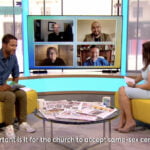 At this time of year there are a myriad of opportunities to speak on local radio, and now even on local television channels. I was fortunate enough to do a media training course as part of my ordination training (despite the fact that residential training is apparently supposed to be bookish and irrelevant to ministry!) and have been involved in regular speaking in the media—on Radio 2 Pause for Thoughts, on BBC Radio Nottingham and other local radio stations, on our local Notts TV, and even once on national television.
At this time of year there are a myriad of opportunities to speak on local radio, and now even on local television channels. I was fortunate enough to do a media training course as part of my ordination training (despite the fact that residential training is apparently supposed to be bookish and irrelevant to ministry!) and have been involved in regular speaking in the media—on Radio 2 Pause for Thoughts, on BBC Radio Nottingham and other local radio stations, on our local Notts TV, and even once on national television.
These are my reflections on how to make the most of the opportunities—and they are worth making the most of.
1. Make sure you tie down the details at the first point of contact. What is the show? What is the issue? Who else will be there? What is the format? What time is it at and where do I need to be when? The golden rule here should be: no surprises. The last thing you want is to turn up on the day and find that it is different from what you expected, or that you are being ‘set up’ in some way.
2. Get there in good time. You want to be thinking about the issue, not about getting there on time. How will you travel, and if by car where can you park? This is particularly important if it is the first time you have been to this venue and meeting these people.
3. Do your research. Go online and find out what the issues are and what is being said.. If you have been given some notice, rather than being called on at the last minute, listen to other items on television and radio on this subject. What is the state of the public debate on this question? This will enable you to put your comments in a wider context. If you can, listen to the show you are going to be on; I tune in to Radio Nottingham in the car on the way in to town when I am appearing on it. It is nice for presenter to think you actually listen to the show. It is nice for audience to hear you as part of an ongoing discussion. And it is helpful for you to be able to say ‘As the person said on the previous item…’
4. Make sure you have with you a pencil and paper. Makes notes before and during the discussion. Doodle and scribble, and highlight the things you think are important. If you are in discussion with someone else, make note as they are speaking so you plan your response.
5. Say first what is most important. If you are on for 2 or 3 minutes (a typical interview format) you might only have five sentences in total. Time flies on air! So decide what is most important, and get that in first. If you leave your most important point to second or third place, you might never get to say it.
6. Here’s the controversial one: Avoid the question. By that I mean: if the interviewer asks you ‘When did you stop beating your wife?’ then there is no right answer. You need to say what you want to say (assuming of course that it is in the relevant area!) whatever the question that you are asked. You see politicians doing this all the time—because it is an effective way to control the message. There is a big disadvantage here though: you see politicians doing this all the time. This approach, if handled in the wrong way, can frustrate the audience and annoy your interviewer. So in reality there is more of a negotiation, particularly if you know the interviewer and you are a regular or semi-regular on the show or station. But it is certainly a strategy worth bearing in mind.
7. Know your message. Think: for people who are not church-goers, or who know very little about Jesus and what following him means, what is the most important thing you can communicate? Research suggests that people leave or stay away from church because it is boring, irrelevant, and because Christians are hypocrites. For me, that means the three most important things to communicate (across all the subjects on which I speak) are that faith in Jesus (not ‘religion’!) is exciting, relevant and has integrity. And you need to embody what you say, so always include examples from your own experience that listeners will be able to relate to. The medium is the message—or perhaps, better, the messenger is the message. If you want Christian faith to be winsome, then you need to be winsome…
8. Smile. Be positive and be yourself. People don’t want to hear someone being snide or negative; there is always a positive way to put things. If you smile, people can hear it. But there is no harm in disagreeing. ‘Actually, I take a different view’ is something that people are happy to listen to—and healthy debate actually makes for good radio (and television). The last time I was on Notts TV, the (mild) complaint was that the four of us guests agreed with each other too much!
9. Don’t preach. This is not a context for challenging people or demanding things. It is a place of public debate. It is not permissible to say ‘You must do X or Y’—though it is quite permissible to say clearly ‘Many Christians believe that God calls us to do X or Y’. Again, clarity and honesty are good strategies, but without attempts at coercion.
10. Do it! Say yes the first time you are asked. Consider the situation of the researcher or producer; his or her concern is not to get the world’s authority, or the best balanced, or to be sure that your particular theological perspective is represented. They need to sign people up, and if you say ‘I’ll let you know in 3 hours’ they will have filled the slot by then. And take every opportunity your diary will allow. Practice makes perfect, and speaking on radio is great training for other forms of speaking, including preaching. There is no substitute for accumulating experience. It does take time, and sometimes seems hard to justify. It takes me a total of an hour and a quarter early on a Sunday morning to contribute 2 or 3 minutes on local radio, which hardly seems worth it—until you consider the numbers you are reaching, in my case, more than 100,000. And you would be surprised at who is listening in.
I have less experience working with television, but most of the same things apply. You cannot take a literal pencil and paper with you, so you need to practice working with a mental list, listening carefully and planning responses in your head. In that sense, radio experience is a good rehearsal for TV experience.
Enjoy!
Much of my work is done on a freelance basis. If you have valued this post, would you consider donating £1.20 a month to support the production of this blog?



























